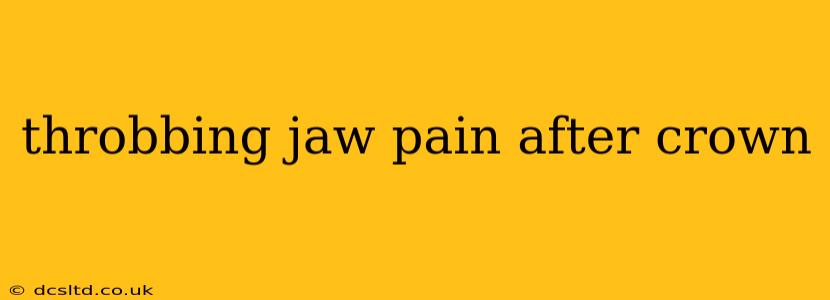Experiencing throbbing jaw pain after receiving a dental crown is concerning, but it's not uncommon. Several factors can contribute to this discomfort, ranging from minor irritation to more serious complications. This comprehensive guide will explore the potential causes, effective treatment options, and preventative measures to alleviate your pain and ensure long-term oral health.
What Could Be Causing My Throbbing Jaw Pain After a Crown?
Post-crown jaw pain can stem from several sources. It's crucial to understand these possibilities to receive appropriate treatment.
-
Inflammation and Irritation: The placement of a crown involves some degree of manipulation of the tooth and surrounding gum tissue. This can lead to inflammation and temporary irritation, causing throbbing pain, especially in the jaw area. This is often the most common cause and usually subsides within a few days.
-
Improper Bite: If your bite is off after the crown is placed, it can put extra pressure on your jaw joint (temporomandibular joint or TMJ), leading to pain. This misalignment can occur even with a seemingly perfectly fitted crown.
-
Sinus Issues: The upper molars are close to the sinuses. If there's an infection or inflammation in your sinuses, it can refer pain to your jaw, sometimes intensified after a dental procedure.
-
Existing TMJ Disorder: Pre-existing temporomandibular joint disorders (TMJD) can be exacerbated by the stress of dental work. The crown placement might inadvertently worsen an underlying condition, resulting in increased jaw pain.
-
Infection: In rare cases, an infection can develop under the crown. This is a serious complication and requires immediate professional attention. Symptoms often include severe, persistent pain, swelling, and potentially fever.
-
Dental Abscess: A dental abscess, a collection of pus near the root of a tooth, can cause throbbing jaw pain, especially if the tooth in question was recently crowned.
What Should I Do if I Have Throbbing Jaw Pain After a Crown?
If you're experiencing throbbing jaw pain after receiving a crown, the first step is to contact your dentist immediately. They can accurately assess the situation and provide the best course of action. Delaying treatment could lead to more severe complications.
Is the Throbbing Jaw Pain Normal After a Crown?
Some mild discomfort is expected after receiving a crown, but throbbing pain is usually not normal. While initial soreness is typical, it shouldn't be severe or persistent. If the pain is intense, lasts for more than a few days, or is accompanied by other symptoms like swelling or fever, seek professional help.
How Long Does Jaw Pain After a Crown Last?
The duration of jaw pain varies considerably depending on the cause. Mild irritation usually resolves within a few days with over-the-counter pain relievers and good oral hygiene. However, if the pain is caused by a more serious underlying issue, it could last much longer and require more extensive treatment.
How Can I Prevent Jaw Pain After Getting a Crown?
Prevention is always better than cure. While you can’t always avoid all potential issues, these steps can help minimize the risk of post-crown jaw pain:
-
Choose an experienced dentist: An experienced and skilled dentist is more likely to minimize trauma during the procedure, reducing the risk of inflammation and irritation.
-
Follow post-operative instructions carefully: Your dentist will provide specific instructions on post-operative care. Following these instructions diligently is crucial for proper healing.
-
Maintain good oral hygiene: Brush and floss regularly to keep the area clean and prevent infection.
-
Avoid chewing hard foods: Give your jaw a break by avoiding hard-to-chew foods for a few days after the procedure.
When Should I Seek Emergency Dental Care for Jaw Pain?
Seek emergency dental care if you experience:
- Severe, unrelenting pain: Pain that doesn't respond to over-the-counter pain relief.
- Swelling: Significant swelling around the affected area.
- Fever: A high fever accompanied by jaw pain.
- Difficulty opening your mouth: Limited jaw mobility.
Don't hesitate to contact your dentist or seek emergency dental care if you have any concerns about your jaw pain after receiving a crown. Early intervention can often prevent more significant problems and ensure a swift recovery. Remember, your dental health is paramount.
